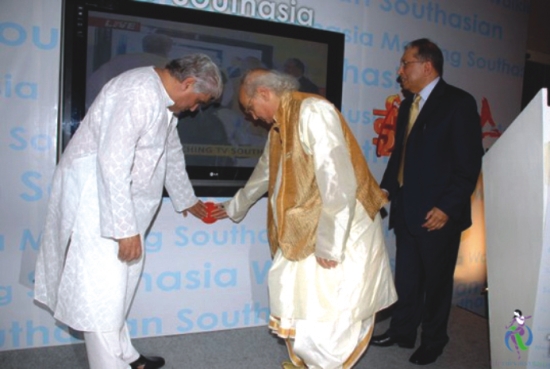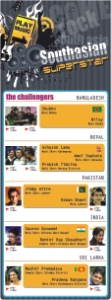|
Trends
A South Asian Platform

TV South Asia links lands and legacies |
Elita Karim
On October 4, 2008, journalists, academicians, young students and professionals from all over South Asia came together at the ITC Sonar Bangla hotel in Kolkata for a colloquium on 'Religion and Media', organised by TV South Asia in collaboration with Tara TV. Moderated by Rubana Huq, the CEO of TV South Asia, the otherwise cosy and cheerful environment inside the hall turned slightly sombre when clips from a recent Pakistani talk show episode were presented to the group. Right after the bombs hit the Marriott Hotel in Pakistan, a caller got into a riff with George, one of the hosts of the talk show 'Kiran aur George' on TV South Asia, a live talk show, when the caller suggested that the media was probably worsening the situation by presenting all the negative elements of the bomb blasts to the outside world. "Why can't we be more positive?" asked the caller. The disturbed talk show host, instead, wondered how the media was supposed to play a more positive role, where a catastrophe had just struck the civilians.
On a stretch of land where people share religions, languages and cultures, such devastations have now become a part and parcel of people living in South Asia. Probably with this in mind, a group of activists and broadcasters had met in Kolkata in early December 2006, at the initiative of Tara News and decided to put together a magazine show, 'Southasian'. Incidentally, the launch of 'Southasian' happened on the eve of the 14th SAARC Summit in Delhi. The first programme was aired on the April 8, 2007 which led to the broadcasters' decision on the 16th of August 2007 to form the channel, TV South Asia. The channel officially began telecasting programmes on the April 19, 2008. The 30-minute weekly show, 'Southasian' had news analysis, music, features, interviews and much more.
According to Rathikant Basu, the owner of Tara TV and TV South Asia, the objective of this television channel is to address the common issues of the region and make the audience aware of the same. For instance, in the programme, 'Southasia Calling', people from all over the region connect together on a virtual platform to discuss issues common in the region, starting from politics, music to daily habits. The show 'Is Southasia ready for the truth?' actually addresses the Truth Commissions all over the region, focusing on the judiciary and also violation of human rights in South Asia and much more.

Famous personalities Javed Akhtar and Pandit Jasraj launch the channel, while Rathikant Basu looks on.
Rubana Huq, the CEO of TV South Asia says that for the very first time in history, private electronic media channels have come together and formed a collaborative channel sharing the same viewpoints on diversity, heritage, bondage and possibilities. Channels like Aaj TV from Pakistan, Rtv in Bangladesh, Image Channel in Nepal, MTV Channel in Srilanka and Tara News in India have partnered with South Asia, to contribute contents and airtime.
With the motto, linking lands and legacies, the people behind TV South Asia believe in unity within diversity. For instance, very soon, viewers living in Nepal might be experiencing the rich heritage of music and theatre that we have in Bangladesh through this channel and viewers in Bangladesh will also be more aware of the daily activities in art, politics, business and so on in the neighbouring countries through this channel. "The channel is essentially an English Channel," explains Rubana Huq. "But there are many programmes like live shows like 'Kiran Aur George' from AAJ TV, Pakistan which is partly in Urdu; there are 'Music of Your Choice' and 'Video Select' both music programmes from Image Channels, Nepal which are partly in Nepali, and there are many programmes from RTV which are in Bangla. Besides, there are Bangla telefilms, which are already subtitled and being televised in the channel. The stress on the projection of culture and heritage is one of the focal points of the channel."
 |
| A dancer performing at the launching ceremony |
Rubana Huq, the CEO of the television channel herself hosts a weekly show called the 'Southasia Calling' |
For those who still do not get this channel through their cable operators, just switch on to

Several contestants have lined up for the Southasian Superstar Contest |
www.tvsouthasia.com/programs and check out the latest in 'Chat Southasia', where interviews are hosted by Paranjay Guhathakurta in Delhi and Syandika in Kolkata, 'Southasia Calling/Southasia Meeting/ Southasia Walking (India)', a talk show hosted by Rubana Huq, in conversation with a South Asian celebrity, 'Aawaz' (Pakistan), a social barometer that highlights the concerns of the nation and allows the public to voice opinions, exploring issues right at the source, 'Nothing Personal' (Sri Lanka), a chat show of interviews of Sri Lankan personalities and celebrities, 'Cooking up a Storm' with Shawkat Osman (Bangladesh), a cookery show by gourmet chef Shawkat Osman who will cook up a storm of regional recipes and give titbits of information regarding the regional cuisine and culture and much more. In fact, many viewers find an immense amount of pleasure in the various musical programmes and the various tele-films that are shown on this channel, giving everyone a chance to explore the neighbouring ideologies and the urban-day crisis in the many sectors of life. Currently, a favourite amongst aspiring singers and musicians, the 'Southasian Super Star' has been launched which is a musical talent hunt in Nepal, Sri Lanka, India and Bangladesh to find a new singing star. After regional competitions are held, the regional winners will compete with each other in the Mega final before the end of the year to determine the Southasian Super Star. "There are, at present 80,000 viewers in Dhaka who watch the channel," says Rubana. "Some are also unaware of the channel position and therefore they need to re-tune their sets and look for the channel. As for channel promotion, we have deliberately been a little slow, as we need to assess all the markets out there in the region and also evaluate our viewership in the other participating countries."
Even though it might seem like a very small dip in the pool for many, the establishment of the channel TV Southasia, in its own way, is an effort to make the people living in different parts of South Asia aware of the strong common grounds that they share. TV South Asia, according to the authorities, should be positioned as a channel that shapes the region through recognising diversities from a unified platform.
Copyright
(R) thedailystar.net 2008 |
|
